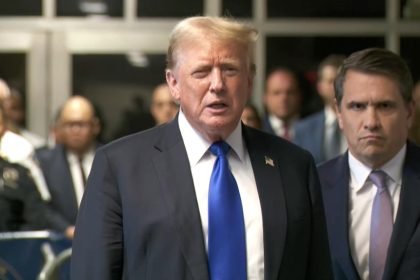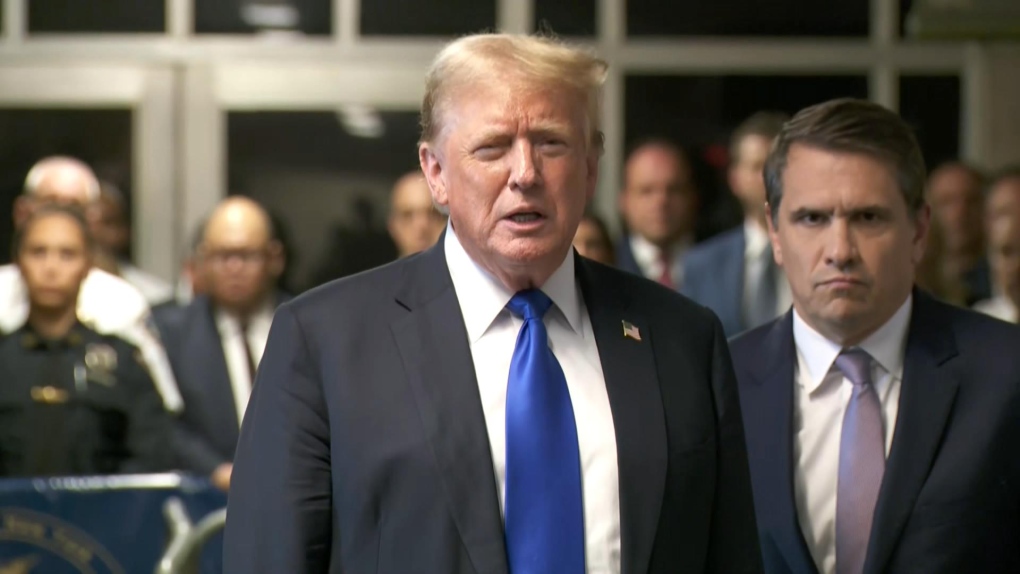
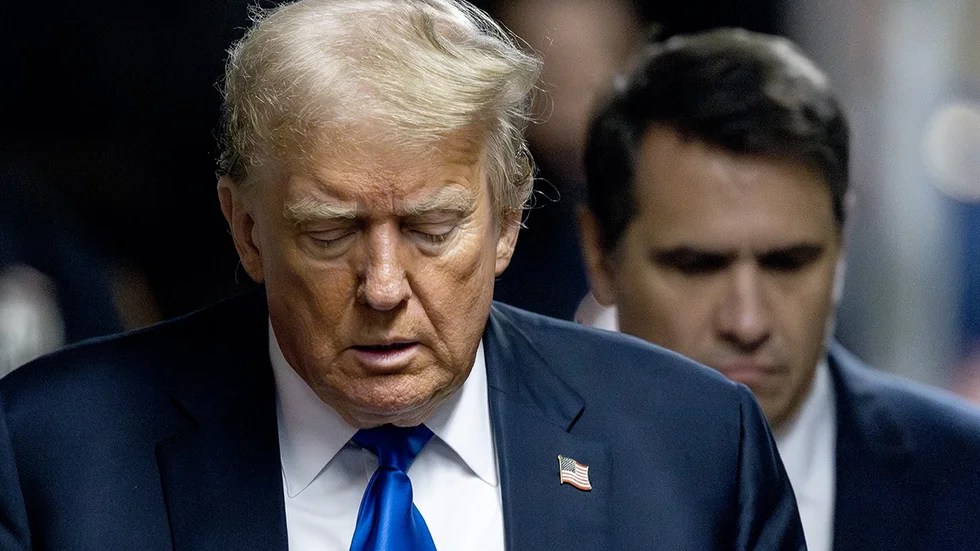
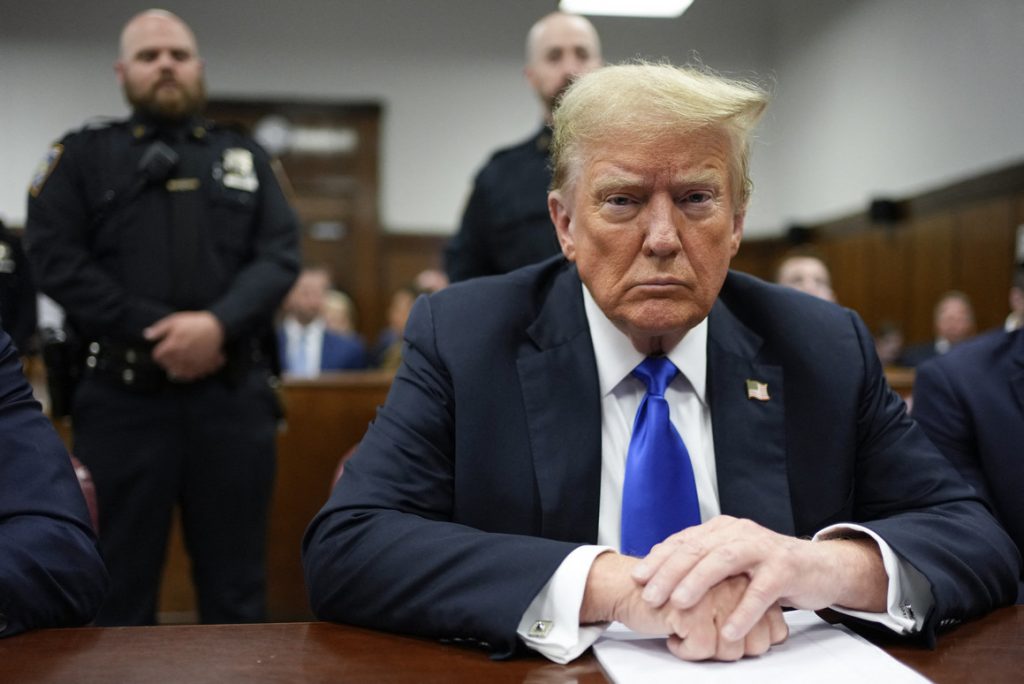
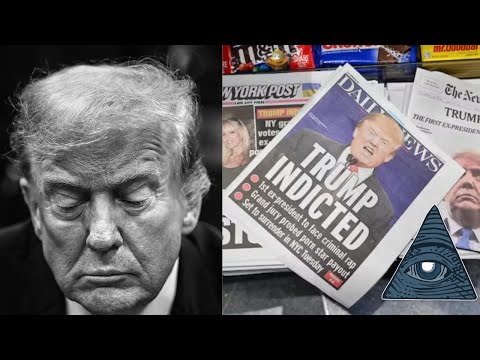
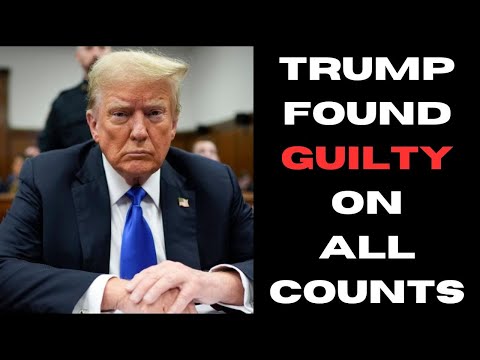
DONALD JOHN TRUMP: First America’s former President, now a Convicted Felon, found GUILTY on all 34 Counts of Business Fraud, Sentencing set for July 11th in New York
…’I am a Political Prisoner, I am Innocent, didn’t commit any crime, the trial is a sham; I will surely appeal against the ruling,’ angry 45th President of the United States lament
*“I could spend 187 years in jail for being found guilty of falsifying business records. It is a rigged trial. We’re going to be appealing this scam from the New York Justice Juan Merchan who is a tyrant. If they can do this to me, they can do this to anyone”-TRUMP
*”No one is above the law. Donald Trump was given every opportunity to defend himself. It was a state case, not a federal case, heard by a jury of 12 citizens-12 Americans, 12 people like you, like millions of Americans who’ve served on juries. This jury was chosen the same way every jury in America is chosen. It was a process that Donald Trump’s attorney was part of. He was found guilty on 34 counts. Trump now have the opportunity as he should to appeal. It’s reckless, it’s dangerous, it’s irresponsible for anyone to say this was rigged just because they don’t like the verdict”-President Joe Biden
*”Falsifying business records in the first degree: A person is guilty of falsifying business records in the first degree when he commits the crime of falsifying business records in the second degree, and when his intent to defraud includes an intent to commit another crime or to aid or conceal the commission thereof. Falsifying business records in the first degree is a class E felony”-New York State Law Penal Law S 175.10
“The minimum jail sentence for a Class E felony is one year, and the maximum sentence is five years if a charge carries a sentence over five years, it is classed as a Class D felony or higher”-NYC Criminal Defense Lawyer, JULIE Rendelman
*BY GEORGE ELIJAH OTUMU/AMERICA Senior Investigative Editor, NAIJA STANDARD NEWSPAPER
THE 45TH PRESIDENT OF UNITED STATES, Donald Trump has entered his name into the Halls of Infamy after he became the first former American president to be convicted of felony crimes Thursday as a New York jury found him guilty of all 34 charges in a scheme to illegally influence the 2016 election through a hush money payment to a porn actor who said the two had sex, relating to falsifying business documents. The myth behind Donald Trump had been shattered by his conviction.
According to New York State Law Penal Law S 175.10: “When a person is guilty of falsifying business records in the first degree is when he commits the crime of falsifying business records in the second degree, and when his intent to defraud includes an intent to commit another crime or to aid or conceal the commission thereof. Falsifying business records in the first degree is a class E felony.
The sentence is five years if a charge carries a sentence over five years, it is classed as a Class D felony or higher in the words of New York City Criminal Defense Lawyer, JULIE Rendelman
Trump sat stone-faced while the verdict was read as cheering from the street below could be heard in the hallway on the courthouse’s 15th floor where the decision was revealed after more than nine hours of deliberations.
“This was a rigged, disgraceful trial,” an angry Trump told reporters after leaving the courtroom. “The real verdict is going to be Nov. 5 by the people. They know what happened, and everyone knows what happened here.”
Judge Juan M. Merchan set sentencing for July 11, just days before the Republican National Convention in Milwaukee, where GOP leaders, who remained resolute in their support in the aftermath of the verdict, are expected to formally make him their nominee.
The verdict is a stunning legal reckoning for Trump and exposes him to potential prison time in the city where his manipulations of the tabloid press helped catapult him from a real estate tycoon to reality television star and ultimately president. As he seeks to reclaim the White House in this year’s election, the judgment presents voters with another test of their willingness to accept Trump’s boundary-breaking behavior.
Trump is expected to appeal the verdict and will face an awkward dynamic as he returns to the campaign trail tagged with convictions. There are no campaign rallies on the calendar for now, though he traveled Thursday evening to a fundraiser in Manhattan that was planned before the verdict, according to three people familiar with his plans who were not authorized to speak publicly.
He’s expected to appear Friday at Trump Tower and will continue fundraising next week. His campaign was already moving quickly to raise money off the verdict, issuing a pitch that called him a “political prisoner.”
The falsifying business records charges carry up to four years behind bars, though Manhattan District Attorney Alvin Bragg would not say Thursday whether prosecutors intend to seek imprisonment, and it is not clear whether the judge — who earlier in the trial warned of jail time for gag order violations — would impose that punishment even if asked.
The conviction, and even imprisonment, will not bar Trump from continuing his White House pursuit.
Trump faces three other felony indictments, but the New York case may be the only one to reach a conclusion before the November election, adding to the significance of the outcome. Though the legal and historical implications of the verdict are readily apparent, the political consequences are less so given its potential to reinforce rather than reshape already hardened opinions about Trump.
For another candidate in another time, a criminal conviction might doom a presidential run, but Trump’s political career has endured through two impeachments, allegations of sexual abuse, investigations into everything from potential ties to Russia to plotting to overturn an election, and personally salacious storylines, including the emergence of a recording in which he boasted about grabbing women’s genitals.
The case’s general allegations have also been known to voters for years and, while tawdry, are widely seen as less grievous than the allegations he faces in three other cases that charge him with subverting American democracy and mishandling national security secrets.
Ahead of the verdict, Trump’s campaign had argued that, no matter the jury’s decision, the outcome was unlikely to sway voters and that the election would be decided by issues such as inflation.
Even so, the verdict is likely to give President Joe Biden and fellow Democrats space to sharpen arguments that Trump is unfit for office, though the White House offered only a muted statement that it respected the rule of law. Conversely, the decision will provide fodder for the presumptive Republican nominee to advance his unsupported claims that he is victimized by a criminal justice system he insists is politically motivated against him.
Trump maintained throughout the trial that he had done nothing wrong and that the case should never have been brought, railing against the proceedings from inside the courthouse-where he was joined by a parade of high-profile Republican allies-and racking up fines for violating a gag order with inflammatory out-of-court comments about witnesses.
After the verdict, Trump lawyer Todd Blanche said in television news interviews that he did not believe Trump received a fair trial and that the team would appeal based on the judge’s refusal to recuse himself and because of what he suggested was excessive pretrial publicity.
Republicans showed no sign of loosening their embrace of the party leader, with House Speaker Mike Johnson lamenting what he called “a shameful day in American history.” He called the case “a purely political exercise, not a legal one.”
The first criminal trial of a former American president always presented a unique test of the court system, not only because of Trump’s prominence but also because of his relentless broadsides on the foundation of the case and its participants. But the verdict from the 12-person jury marked a repudiation of Trump’s efforts to undermine confidence in the proceedings or to potentially impress the panel with a show of GOP support.
“While this defendant may be unlike any other in American history, we arrived at this trial and ultimately today in this verdict in the same manner as every other case that comes through the courtroom doors, by following the facts and the law and doing so without fear or favor,” Bragg said after the verdict.
The trial involved charges that Trump falsified business records to cover up a hush money payment to Stormy Daniels, the porn actor who said she had sex with the married Trump in 2006.
The $130,000 payment came from Trump’s former lawyer and personal fixer Michael Cohen to buy Daniels’ silence during the final weeks of the 2016 race in what prosecutors allege was an effort to interfere in the election. When Cohen was reimbursed, the payments were recorded as legal expenses, which prosecutors said was an unlawful attempt to mask the true purpose of the transaction.
Trump’s lawyers contend they were legitimate payments for legal services. He denied the sexual encounter, and his lawyers argued at trial that his celebrity status made him an extortion target.
Defense lawyers also said hush money deals to bury negative stories about Trump were motivated by personal considerations such as the impact on his family, not political ones. They also sought to undermine the credibility of Cohen, the star prosecution witness who pleaded guilty in 2018 to federal charges related to the payments, by suggesting he was driven by personal animus toward Trump and fame and money.
The trial featured weeks of occasionally riveting testimony that revisited an already well-documented chapter from Trump’s past. His 2016 campaign, threatened by the disclosure of an “Access Hollywood” recording that captured him talking about grabbing women sexually without their permission, also faced the prospect of other stories about Trump and sex surfacing that could have harmed his candidacy.
Trump did not testify, but jurors heard his voice through a secret recording of a conversation with Cohen in which he and the lawyer discussed a $150,000 hush money deal involving a Playboy model, Karen McDougal, who has said she had an affair with Trump. Trump denies that affair.
Daniels herself testified, offering a vivid recounting of the sexual encounter she says they had in a Lake Tahoe hotel suite. The former publisher of the National Enquirer, David Pecker, testified about how he worked to keep stories harmful to the Trump campaign from becoming public at all, including by having his company buy McDougal’s story.
Jurors also heard from Keith Davidson, the lawyer who negotiated the hush money payments on behalf of Daniels and McDougal. He detailed the tense negotiations to get both women compensated for their silence but also faced aggressive questioning from a Trump attorney who noted Davidson had helped broker similar hush money deals in cases involving other prominent figures.
The most pivotal witness, by far, was Cohen, who during days of testimony gave an insider’s view of the hush money scheme and what he said was Trump’s detailed knowledge of it.
“Just take care of it,” he quoted Trump as saying.
He offered jurors the most direct link between Trump and the heart of the charges, recounting a meeting in which a plan to have Cohen reimbursed in monthly installments for legal services was discussed.
And he emotionally described his dramatic break with Trump in 2018, when he began cooperating with prosecutors after a decade-long career as the then-president’s personal fixer.
“To keep the loyalty and to do the things that he had asked me to do, I violated my moral compass, and I suffered the penalty, as has my family,” Cohen said.
The case, though criticized by some legal experts who called it the weakest of the prosecutions against Trump, took on added importance not only because it proceeded to trial first but also because it could be the only only one to reach a jury before the election.
The other three- local and federal cases in Atlanta and Washington alleging that he conspired to overturn the 2020 election, as well as a federal indictment in Florida charging him with illegally hoarding top-secret records-are bogged down by delays or appeals.
*Will Trump go to prison after hush money trial verdict?
A New York jury’s historic conviction of Donald Trump on felony charges means his fate is now in the hands of the judge he has repeatedly ripped as “corrupt” and “incompetent.”
Two experts told NBC News that it’s unlikely Trump will be imprisoned based on his age, lack of a criminal record and other factors- and an analysis of thousands of cases found that very few people charged with the same crime receive jail time. But a third expert told NBC News he believes it is “substantially” likely Trump could end up behind bars.
Trump was convicted on 34 counts of falsifying business records, a class E felony that is punishable by a fine, probation or up to four years in prison per count. During the trial, Judge Juan Merchan threatened to put Trump behind bars for violating his gag order, but it’s unclear whether the former president will face similar consequences now. It’s expected that any sentence would be imposed concurrently, instead of consecutively.
Former federal prosecutor Chuck Rosenberg, an NBC News analyst, said it’s unlikely that Merchan would sentence Trump, 77, to any jail time, given his age and his status as a first-time, nonviolent offender. “I’d be very surprised if there’s any sentence of incarceration at all,” Rosenberg said. “Of course, he did spend a good bit of time insulting the judge who has the authority to incarcerate him.”
The next step for Trump at this point is his sentencing, which is set for July 11. Manhattan District Attorney Alvin Bragg would not comment Thursday on what type of sentence he’d seek, saying his office would do its speaking in court papers in the weeks ahead.
Arthur Aidala, a former prosecutor in the Brooklyn district attorney’s office who’s now a defense lawyer, said the judge will most likely use some of the time before sentencing to research similar cases to determine what the median sentence is.
“He wants to know before he sentences someone what the typical sentence is,” Aidala said, and would consider other factors, like Trump’s age and lack of a criminal record, while also taking into account the lack of injury caused by the crime. Aidala said he believes whatever punishment Merchan comes up with would be “a non-jail disposition.”
An analysis conducted by Norm Eisen, who worked for House Democrats during Trump’s first impeachment, found that roughly 1 in 10 people who have been convicted of falsifying business records are imprisoned and that those cases typically involved other crimes.
Ron Kuby, a veteran New York criminal defense lawyer, took a different view.
“Judge Merchan is known for being a harsh sentence when it comes to white-collar crimes committed by people who have wealth and privilege and power,” he said.
Kuby added he believes “it is substantially likely Judge Merchan will sentence Trump to jail or prison time,” despite the logistical and practical complications that locking up a person with Secret Service protection would entail.
Kuby said that’s because the criminal scheme went on for over a year and included a number of bad acts on Trump’s part.
“It’s an entire course of conduct he was involved with- not just one bad decision,” he said.
Trump, however, most likely doesn’t have to worry about missing the Republican National Convention, where he’s expected to accept the party’s nomination, even though it’s taking place just days after his sentencing. Kuby said he’d most likely be able to remain free while he appeals the conviction.
Trump’s behavior during the trial, including his flouting Merchan’s gag order by making comments about witnesses and the jury, isn’t likely to be a factor in the sentencing decision, Kuby said. It’s also highly unlikely that comments that appeared to be aimed at sidestepping the gag order by Republican officials who attended the trial as Trump’s guests will figure into Merchan’s reasoning, Kuby added.
“If the judge is smart, he’d stay away from that,” Kuby said. “The best way for judges not to get reversed in a sentencing is to stick to the facts and circumstances of the crimes and conviction.”
Rosenberg said that despite Trump’s frequent criticisms of Merchan, which he likened to “a batter who’s been yelling at the umpire from before the first pitch,” Merchan appeared to run “a clean and fair trial.”
Rosenberg and Kuby agreed that Trump would appeal the verdict. Kuby said that could delay Trump’s serving whatever punishment Merchan doles out for years, even if the appeal is ultimately unsuccessful.
His first appeal will be to the state Appellate Division, a midlevel appeals court, and it will almost certainly not decide the appeal until after the November election, Kuby said. If he loses there, he could then appeal to the state’s highest court, the Court of Appeals. A loss there would be followed by a request to the U.S. Supreme Court to hear the case.
If all that fails, Kuby said, he could then try turning to federal court in another attempt to eventually get the case before the Supreme Court.
The appeals process typically takes a long time-Kuby said he had one client who staved off prison time for six years- but there’s another potential complicating factor in this case.
“If he becomes president of the United States, he cannot be incarcerated in a state prison” while he’s in office, Kuby said, because it could prevent him from fulfilling his constitutional duties. If he lost his appeals, “by the time he leaves office- if he leaves office- he’d be ready to be incarcerated,” he said
*An angry Trump pledges to appeal ‘this scam’ conviction as Republicans vow resistance:
Former President Donald Trump, now a convicted felon, vowed to launch an appeal based “on many things” he considered unfair during his New York trial, he said Friday in the lobby of Trump Tower in Midtown Manhattan.
Trump said: “I am a Political Prisoner, I am Innocent, didn’t commit any crime, the trial is a sham; I will surely appeal against the ruling”.
Meanwhile Friday, legal and political analysts predicted he will spend little if any time in jail depending on the outcome of that appeal, fundraising among supportive Republicans appeared to surge and eight GOP members of the U.S. Senate pledged they will not support any Democratic priorities or nominations.
The reactions came as Americans continued to digest the news that on Thursday, a jury in Lower Manhattan found the Republican Party’s presumed 2024 presidential nominee guilty on 34 counts of falsifying business records in the first degree, a felony in New York.
The roughly seven-week proceeding marked the first-ever criminal trial of a former U.S. president.
“We’re going to be appealing this scam,” Trump said at his late-morning press conference, referring to New York Justice Juan Merchan as a “tyrant.”
Over about 30 minutes of often misleading or false comments delivered in his familiar stream-of-consciousness style that jumped from topic to topic, Trump complained about aspects of the trial, said the case shouldn’t have been prosecuted at all and made campaign-style appeals on immigration and crime.
Trump has centered his public relations defense on the idea that the prosecution was politically motivated, often blaming the Biden administration, and he repeated the theme throughout his Friday remarks.
“If they can do this to me, they can do this to anyone,” he said.
President Joe Biden said Friday that Trump “was given every opportunity to defend himself.”
“It was a state case, not a federal case. It was heard by a jury of 12 citizens, 12 Americans, 12 people like you, like millions of Americans who’ve served on juries. This jury was chosen the same way every jury in America is chosen. It was a process that Donald Trump’s attorney was part of,” Biden said from the White House before delivering remarks on the Israel-Hamas conflict.
Biden said Trump now has the opportunity “as he should” to appeal, just like anyone else who is tried in the U.S.
“That’s how the American system of justice works,” Biden said. “It’s reckless, it’s dangerous, it’s irresponsible for anyone to say this was rigged just because they don’t like the verdict.”
*Jail time?
Trump told the crowd Friday morning he could spend “187 years” in jail for being found guilty of falsifying business records. It was not clear how he arrived at that number.
Most observers of his trial and the New York justice system disagree with that estimate.
Merchan set Trump’s sentencing for July 11 at 10 a.m. Eastern, just four days before the Republican National Convention kicks off in Milwaukee, Wisconsin, where the GOP will officially nominate Trump for president in November’s election.
Trump is convicted of class E felonies, the lowest level felony in New York state, and each carries the possibility of probation to up to four years in prison.
Any incarceration sentence up to a year would be served in the city’s Rikers Island jail or another local facility. Incarceration beyond that time frame would be served at a state facility.
“If that jail sentence happens, it probably will be less than a year,” said Norm Eisen, former White House special counsel in the Obama administration, who has been commenting on the indictment and trial for months.
Eisen spoke during a virtual press conference hosted by the Defend Democracy Project.
New York state law experts say Merchan may not be inclined to imprison a former, and possibly future, U.S. president. And, if he sentences Trump to any length of incarceration, it will likely be stayed-a temporary stop to the action-pending appeal.
Trump could remain free on bail conditions set by the court, or no bail conditions, subject to a decision by the appeals court and potentially any other review if an appeals judge sends the case to the state’s highest court.
“When there is a stay pending appeal, generally, the process is expedited more quickly than it would be if the defendant was at liberty and there was no stay. But even so, this is going to go beyond the election,” said retired New York Supreme Court Judge Michael Obus at the press conference with Eisen.
DONATE TO HELP BUILD A SPECIAL APPS FOR JOURNALISTS AGAINST LIVER ELEVATION & KIDNEY FAILURE:
CERTAINLY, Good journalism costs a lot of money. Without doubt, only good journalism can ensure the possibility of a good society, an accountable democracy, and a transparent government. We are ready to hold every corrupt government accountable to the citizens. To continually enjoy free access to the best investigative journalism in Nigeria, we are requesting of you to consider making a modest support to this noble endeavor.”
By contributing to NAIJA STANDARD NEWSPAPER, you are helping to sustain a journalism of relevance and ensuring it remains free and available to all without fear or favor.
Your donation is voluntary — please decide how much and how often you want to give. For offline donation, email: letters@nigeriastandardnewspaper.com or call +2348037128048 (Nigeria) or +16825834890 (United States of America)


